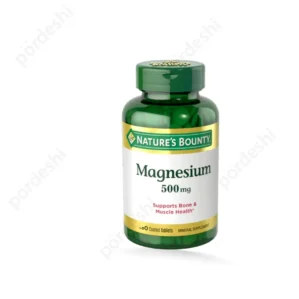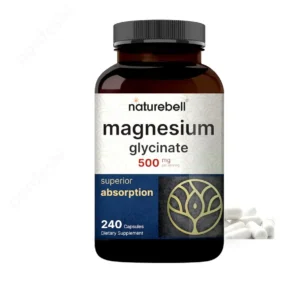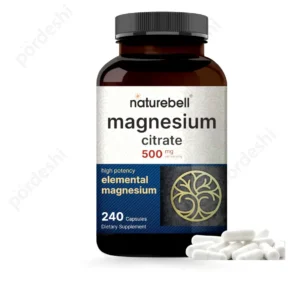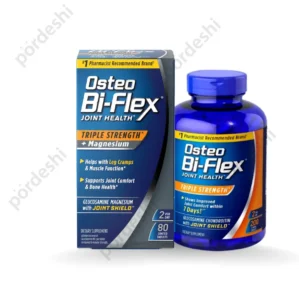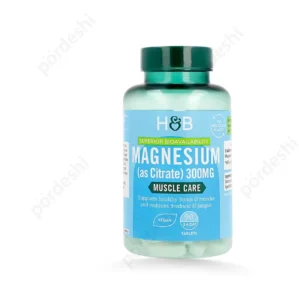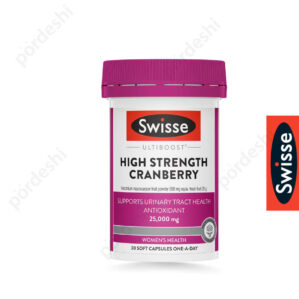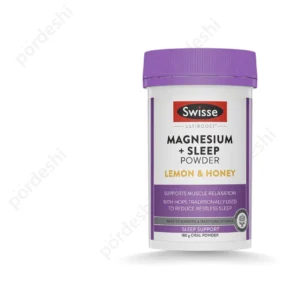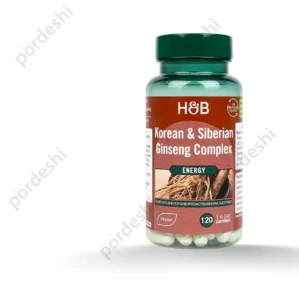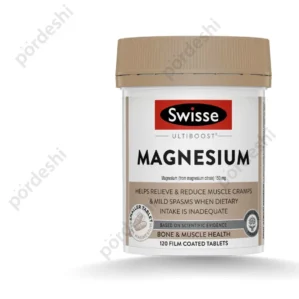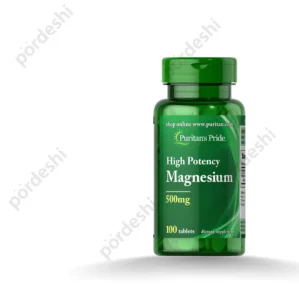magnesium
Showing 1–12 of 17 resultsSorted by latest
Nature’s Bounty Magnesium 500
Original price was: 1,800.00৳.1,700.00৳Current price is: 1,700.00৳.NatureBell Magnesium Glycinate uses
Original price was: 4,200.00৳.3,995.00৳Current price is: 3,995.00৳.Naturebell Magnesium Citrate
Original price was: 3,600.00৳.3,445.00৳Current price is: 3,445.00৳.Swisse Ultiboost High Strength Cranberry 25000mg 30 Capsule
Original price was: 4,500.00৳.3,800.00৳Current price is: 3,800.00৳.Spring Valley Rapid-Release Magnesium Citrate
Original price was: 2,800.00৳.2,599.00৳Current price is: 2,599.00৳.Swisse ultiboost magnesium + sleep
Original price was: 2,400.00৳.2,399.00৳Current price is: 2,399.00৳.Holland & Barrett Magnesium
Original price was: 1,450.00৳.1,295.00৳Current price is: 1,295.00৳.Puritan’s Pride High Potency Magnesium
Original price was: 1,900.00৳.1,849.00৳Current price is: 1,849.00৳.The Ultimate Guide to Magnesium: Benefits, Sources, and How to Choose the Best Supplements
Introduction
Magnesium is an essential mineral that plays a crucial role in numerous bodily functions. From supporting muscle and nerve function to maintaining a healthy immune system, magnesium’s importance cannot be overstated. In this comprehensive guide, we’ll explore what magnesium is, why it’s vital for your health, its natural sources, types, benefits, risks, and tips for choosing the best magnesium supplements. Whether you’re a wellness-conscious individual or simply curious about this vital mineral, this guide is for you.
What Is Magnesium?
Magnesium is a mineral found naturally in many foods, added to other food products, available as a dietary supplement, and present in some medicines (like antacids and laxatives). It assists more than 300 enzymes in carrying out various chemical reactions in the body, such as building proteins and bones, regulating blood sugar, blood pressure, and muscle and nerve functions. Moreover, magnesium acts as an electrical conductor that contracts muscles and makes the heart beat steadily.
Why Is Magnesium Important?
Magnesium is a key factor in making several parts of the body run smoothly. Without enough magnesium, various bodily functions are compromised, leading to a range of health issues. Here are some critical roles that magnesium plays:
- Heart Health: Regulates heart rhythm and helps prevent cardiovascular diseases.
- Bone Health: 60% of the body’s magnesium is stored in bones, assisting in bone-building cell activity and calcium regulation.
- Muscle Function: Acts as an electrical conductor that contracts muscles.
- Nerve Function: Helps in transmitting nerve impulses.
- Blood Sugar Regulation: Assists enzymes that regulate blood sugar and insulin activity.
- Mental Health: Aids neurological pathways, potentially reducing the risk of depression and anxiety.
Who Needs Magnesium?
Everyone needs magnesium, but certain groups may be at higher risk of deficiency:
- Older Adults: Decreased intake and absorption rates.
- People with Gastrointestinal Diseases: Conditions like Crohn’s disease can affect absorption.
- Diabetics: Type 2 diabetes can increase magnesium loss in urine.
- Alcoholics: Excessive alcohol consumption can interfere with magnesium absorption and increase excretion.
- Athletes: Intense physical activity increases magnesium needs.
Natural Sources of Magnesium
Magnesium is found in a variety of food sources, making it relatively easy to incorporate into your diet. Here are some of the best natural sources:
- Nuts and Seeds: Almonds, cashews, peanuts, pumpkin seeds.
- Legumes: Black beans, kidney beans, soybeans.
- Leafy Greens: Spinach, Swiss chard.
- Whole Grains: Brown rice, oatmeal.
- Fish and Poultry: Salmon, beef, chicken.
- Fruits: Bananas, raisins.
- Dairy: Milk, yogurt.
- Dark Chocolate: At least 70% cacao.
Types of Magnesium Supplements
Magnesium supplements come in various forms, each with its own benefits and absorption rates:
- Magnesium Citrate: Highly absorbable, often used for improving digestion.
- Magnesium Oxide: High magnesium content but less bioavailable.
- Magnesium Glycinate: Gentle on the stomach, good for long-term use.
- Magnesium Chloride: High bioavailability, often used for detoxification.
- Magnesium Sulfate: Commonly known as Epsom salt, used in baths for muscle relaxation.
Benefits of Using Magnesium
Incorporating magnesium into your routine can offer a multitude of health benefits:
- Improved Bone Health: Strengthens bones and reduces the risk of osteoporosis.
- Relief from Migraines: Helps in reducing the frequency and severity of migraines.
- Better Mood: Alleviates symptoms of depression and anxiety.
- Cardiovascular Health: Lowers blood pressure and reduces the risk of heart diseases.
- Enhanced Physical Performance: Improves muscle function and reduces cramps.
- Regulated Blood Sugar Levels: Helps in managing type 2 diabetes.
Risks and Side Effects
While magnesium is generally safe, excessive intake can lead to adverse effects:
- Diarrhea: High doses of magnesium supplements can cause diarrhea.
- Nausea and Vomiting: Overconsumption can lead to gastrointestinal issues.
- Muscle Weakness: Excessive magnesium can affect muscle function.
- Low Blood Pressure: High levels can cause a drop in blood pressure.
- Heart Issues: In extreme cases, it can lead to heart rhythm problems.
How to Choose the Best Magnesium Supplement
When selecting a magnesium supplement, consider the following:
- Form: Choose a form that suits your needs (e.g., citrate for digestion, glycinate for long-term use).
- Bioavailability: Opt for forms that are easily absorbed by the body.
- Dosage: Follow the recommended dietary allowance (RDA) and avoid exceeding the tolerable upper intake level (UL).
- Quality: Look for third-party testing and certifications to ensure quality and purity.
- Ingredients: Avoid supplements with unnecessary fillers and additives.
How We Chose
Our selection process for recommending the best magnesium supplements involved:
- Research: Extensive review of scientific studies and clinical trials.
- Expert Opinions: Consultation with healthcare professionals and nutritionists.
- Customer Reviews: Analyzing feedback from real users.
- Quality Standards: Ensuring products meet high manufacturing and safety standards.
Ingredients: What to Pay Attention To
When examining magnesium supplements, pay close attention to:
- Active Ingredient: Ensure it contains the right form of magnesium for your needs.
- Purity: Look for products free from contaminants and heavy metals.
- Additives: Avoid supplements with artificial colors, flavors, or preservatives.
What Is the Difference Between Various Magnesium Forms?
Different forms of magnesium serve various purposes and have different absorption rates:
- Magnesium Citrate: Good for digestion, highly absorbable.
- Magnesium Oxide: High in magnesium content, less absorbable.
- Magnesium Glycinate: Gentle on the stomach, suitable for long-term use.
- Magnesium Chloride: High bioavailability, used for detoxification.
- Magnesium Sulfate: Used in baths for muscle relaxation.
Why Are Calcium, Magnesium, and Zinc Included in Supplements?
Calcium, magnesium, and zinc are essential nutrients that play crucial roles in our body’s functioning. These minerals are often combined in supplements to support bone health, boost immune function, and improve metabolic processes. Their synergistic effect makes them a powerful trio for maintaining overall health and well-being.
Tips for Incorporating Magnesium into Your Diet
Here are some practical tips to ensure you get enough magnesium:
- Eat a Balanced Diet: Include magnesium-rich foods like nuts, seeds, and leafy greens.
- Consider Supplements: If you have specific health concerns or dietary restrictions.
- Stay Hydrated: Proper hydration helps in the absorption of minerals.
- Monitor Your Intake: Keep track of your magnesium consumption to avoid deficiency or toxicity.
TOp Brand as
Natures-bounty, spring valley, puritans pride, 21st century, Doctor’s Best
Pordeshi Picks for the Best Magnesium Supplements in Bangladesh
For our readers in Bangladesh, here are some top-rated magnesium supplements available locally:
Nature’s Bounty Magnesium
- Nature’s Bounty® Magnesium, originating from the USA with a long expiry date, is vital for bone health and plays a crucial role in over 200 enzymatic processes in the body, including bone mineralization, muscle contractions, nerve impulses, energy metabolism, and protein formation. Providing 100% of the daily recommended value in just one softgel, it’s an essential supplement for maintaining good health.
Doctor’s Best High Absorption Magnesium
- This product is 100% made in the USA and offers a long expiry date. It promotes muscle relaxation and has optimized bioavailability for maximum effectiveness. It supports healthy cells with blood glucose, uses a patented, organic, chelated form of magnesium, normalizes cellular processes involving glucose, and controls the formation of Advanced Glycation End-products (AGEs).
Spring Valley Rapid-Release Magnesium Citrate
- This high-quality supplement, made in the USA, contains 100 capsules per bottle, designed for rapid release and quick absorption. It’s specifically formulated to support bone health and overall well-being, with a higher absorption rate than magnesium oxide. It’s essential for bone formation and nerve/muscle health, and free from gluten, yeast, milk, lactose, sugar, preservatives, soy, artificial colors, and flavors, making it suitable for those with common allergies.
21st Century Calcium Magnesium Zinc
- This Malaysian mineral supplement is designed for adults of all ages, supporting bone health, muscle function, and the immune system. It contains essential minerals: calcium, magnesium, and zinc, offering a convenient way to boost your wellbeing. For optimal results, take three tablets daily with meals. Consult a healthcare provider if pregnant, nursing, or on medications. The childproof packaging guarantees safety and freshness.
Conclusion
Magnesium is a versatile and essential mineral that plays a vital role in overall health and well-being. From improving bone health and reducing migraines to enhancing mental health and regulating blood sugar levels, the benefits of magnesium are extensive. By incorporating magnesium-rich foods into your diet and considering high-quality supplements, you can ensure you meet your daily requirements and enjoy the myriad health benefits this mineral offers.
20 Frequently Asked Questions About Magnesium
- What is magnesium?
Magnesium is a mineral essential for various bodily functions, including muscle and nerve function, blood sugar regulation, and bone health.
- Why is magnesium important?
Magnesium supports over 300 enzymatic reactions in the body, making it crucial for overall health.
- What are the natural sources of magnesium?
Nuts, seeds, leafy greens, whole grains, fish, poultry, fruits, and dairy products.
- What are the benefits of taking magnesium supplements?
Improved bone health, relief from migraines, better mood, cardiovascular health, enhanced physical performance, and regulated blood sugar levels.
- What are the risks of taking too much magnesium?
Diarrhea, nausea, vomiting, muscle weakness, low blood pressure, and heart issues.
- How much magnesium do I need daily?
The RDA for adults is 400-420 mg for men and 310-320 mg for women.
- What are the signs of magnesium deficiency?
Fatigue, weakness, poor appetite, nausea, vomiting, numbness, tingling, muscle cramps, and seizures.
- Can I get enough magnesium from food alone?
Yes, but supplements can help if you have specific health concerns or dietary restrictions.
- What forms of magnesium supplements are available?
Magnesium citrate, oxide, glycinate, chloride, and sulfate.
- Which form of magnesium is best for digestion?
Magnesium citrate.
- Which form of magnesium is gentle on the stomach?
Magnesium glycinate.
- Can magnesium help with migraines?
Yes, magnesium supplements can reduce the frequency and severity of migraines.
- Is magnesium safe for pregnant women?
Yes, but it’s essential to consult with a healthcare provider for the appropriate dosage.
- Can athletes benefit from magnesium?
Yes, magnesium improves muscle function and reduces cramps, enhancing physical performance.
- How does magnesium interact with vitamin D?
Magnesium helps convert vitamin D into its active form and aids its absorption.
- What are the signs of magnesium toxicity?
Nausea, vomiting, diarrhea, low mood, muscle weakness, low blood pressure, and heart issues.
- Can magnesium improve mental health?
Yes, it can alleviate symptoms of depression and anxiety.
- How does magnesium support cardiovascular health?
It helps regulate blood pressure and reduces the risk of heart diseases.
- Can magnesium help manage type 2 diabetes?
Yes, it assists enzymes that regulate blood sugar and insulin activity.
- Where can I buy magnesium supplements in Bangladesh?
Check local pharmacies and online stores for top-rated magnesium supplements.
By understanding the importance of magnesium and how to incorporate it into your diet, you can take proactive steps toward better health and wellness. Remember, balance is key, and consulting with healthcare professionals can help you make informed decisions tailored to your individual needs.



 Hair Care
Hair Care
 Vibrating Rings
Vibrating Rings

 Oral Care
Oral Care
